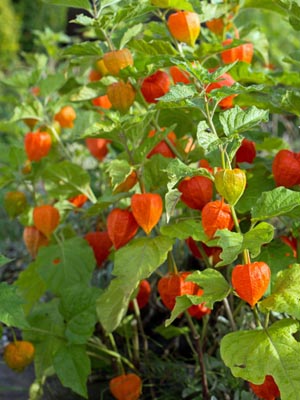Crop Rotation Group
Solanaceae (Potato and tomato family)
|

|
Soil
Fertile, well-drained soil.
|
Position
Full sun to partial afternoon shade.
|
Frost tolerant
Chinese lantern plant is a hardy perennial, tolerating winter cold to -10°F (-23°C).
|
Feeding
In spring just as new growth emerges, mulch the area around Chinese lantern plant with compost.
|
Companions
-
|
Spacing
Single Plants: 11" (30cm) each way (minimum)
Rows: 11" (30cm) with 11" (30cm) row gap (minimum)
|
Sow and Plant
Start Chinese lantern plant seeds indoors in spring, and expect germination in 20 days. Or, plant root divisions taken from an existing colony. Chinese lantern plant will bloom and produce decorative pods in its first year. Young plants need water their first year, but after that Chinese lantern plant is quite drought tolerant.
Our Garden Planning Tool can produce a personalized calendar of when to sow, plant and harvest for your area.
|
Notes
Chinese lantern plant is grown for its decorative orange seed pods. The plants spread by wandering rhizomes and by seed, and can become invasive when left uncontrolled. To limit its spread, grow Chinese lantern plant in a large pot that is sunk into the garden, or grow it next to pavement or a spot that is regularly mowed. A cold-hardy cousin to tomatillo and tomato, all parts of the Chinese lantern plant are poisonous. The ripe fruits were once used medicinally.
|
Harvesting
Gather stems for use in cut arrangements in late summer, or whenever the bracts develop a bright orange color. Cut stems near the ground, strip off the leaves, and either hang in bunches or let the stems dry in a dry vase. You also can allow the lanterns to persist on the plants into winter, until the fibers weather into lacy enclosures around the bright orange berries.
|
Troubleshooting
Chinese lantern plants usually outgrow any pests that find them. Watch for this plant’s tendency to spread where it may not be wanted.
|